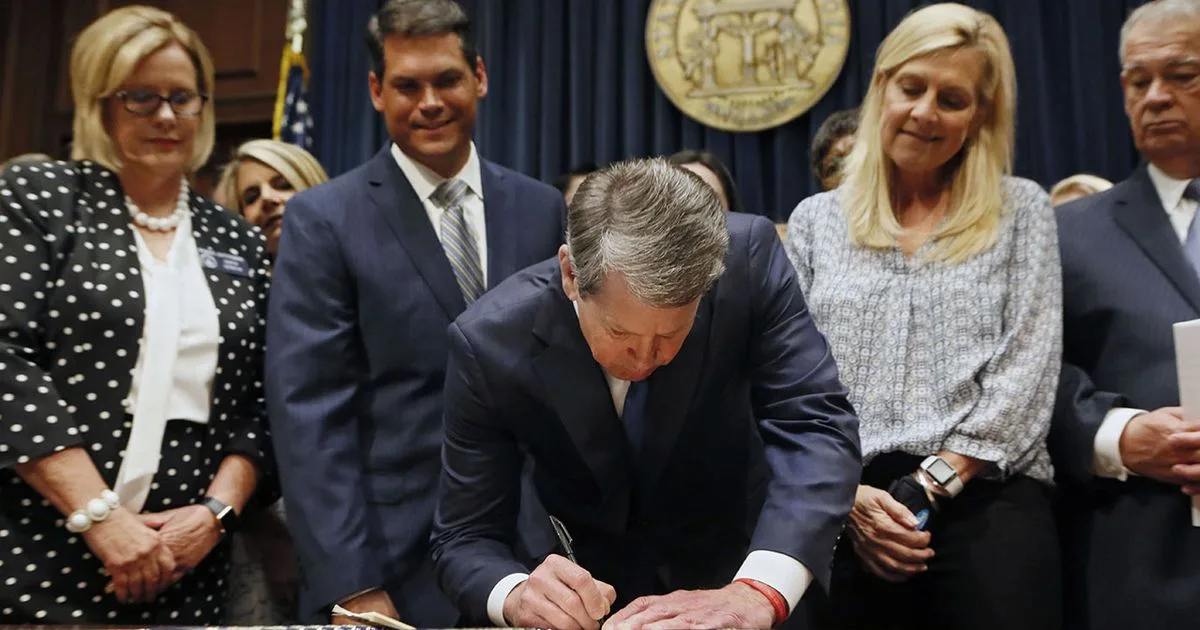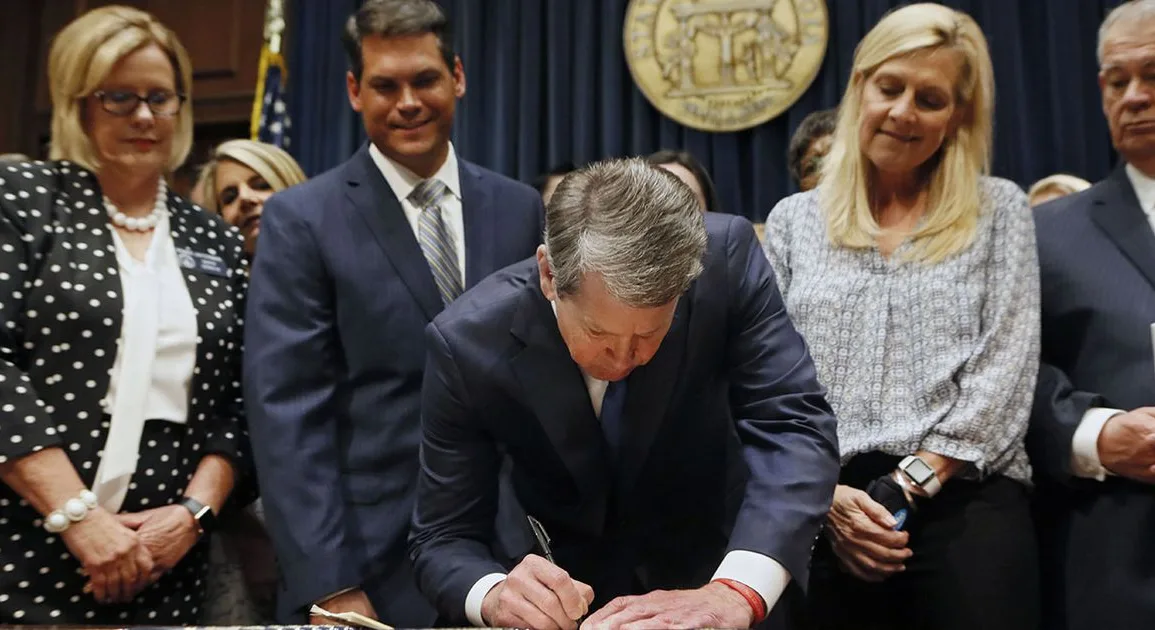
Anti-abortion activists scored a victory this past week when the Georgia Supreme Court allowed the state’s restrictions on the procedure to remain in place while a judge considers challenges to a 2019 law.
The law bans abortions in most cases once a doctor can detect fetal cardiac activity, typically about six weeks into a pregnancy and before many know they are pregnant.
The court’s 6-1 decision rejected an argument made by abortion rights groups and providers maintaining that when the state Legislature passed the statute, the U.S. Supreme Court’s 1973 ruling in Roe v. Wade was still the law of the land, guaranteeing a right to abortion until a fetus was viable outside the mother’s body. The state constitution does not allow the Legislature to enact statutes that violate the law.
The state successfully countered by arguing that it didn’t matter that the fetal cardiac law was not constitutional when the General Assembly approved it because it is now in line with the U.S. Supreme Court’s ruling last year in Dobbs v. Jackson Women’s Health Organization that overturned Roe.
Claire Bartlett, executive director of the anti-abortion Georgia Life Alliance, called the ruling a “huge win” while acknowledging that the legal fight is not over.
“We’re thrilled to pieces about the news,” she said. “The battle continues as it goes back to (Fulton Superior) Judge Robert McBurney for determination of their claim that there’s a right under the Georgia Constitution to abortion, which in our reading it does not. But we shall see.”
Andrea Young, executive director of the American Civil Liberties Union of Georgia — which represented the abortion rights groups in court — said her organization will continue working to overturn the abortion law.
But the fight won’t be limited to the court system, she said.
“Be clear, the right to abortion is on the ballot in 2024,” Young said. “Gov. Brian Kemp and the Georgia Legislature acted to take away our rights. The Georgia Legislature can restore our rights, and we must organize to elect a pro-choice Legislature.”
McBurney will now weigh other arguments over the constitutionality of the law. It’s unclear when he will issue a ruling.
Suit says state has not funded its public HBCUs fairly
Georgia, a federal lawsuit alleges, has failed to fund its three public historically Black colleges and universities at the same levels of other institutions in the state’s University System.
“There should not be two systems of education in Georgia,” said Carlos Moore, a Mississippi attorney who joined several Black Democratic state lawmakers in announcing the suit against the state Board of Regents.
The suit came after federal officials told Georgia and 15 other states last month that they had underfunded their land-grant HBCUs by more than $12 billion in recent decades in comparison with their non-HBCU land-grant peers.
The review looked at per-student funding for Fort Valley State, Georgia’s lone historically Black land-grant school, and the University of Georgia, the state’s original land-grant school, which didn’t admit Black students until 1961.
If per-student funding had been equal for the two schools, Fort Valley State would have received an additional $603 million from the state over the past 30 years, U.S. Secretary of Education Miguel Cardona and U.S. Secretary of Agriculture Thomas Vilsack said in a letter to the state.
An 1890 federal law required states to either end racial discrimination at their land-grant schools or create another land-grant school for Black students. States “were required to provide an equitable distribution” of funds between the two schools, according to the U.S. Department of Education.
UGA had 40,607 students last fall while Fort Valley State had 2,609 students. Fort Valley State’s total current budget is roughly $88 million, while UGA’s was nearly $1.8 billion.
Cardona and Vilsack said the state should make a “substantial” allocation toward the deficit while also committing in future state budgets “to bring parity to funding levels.”
The University System of Georgia previously said it’s working to collect data and planned to respond to the federal letter.
The lawsuit also asks the state to remedy “unequal treatment of” Albany State and Savannah State universities, although John Moore, an Atlanta attorney working on the case, said the amount of alleged underfunding for those two schools will probably be determined during the course of the trial.
Credit: Jason.Getz@ajc.com
Credit: Jason.Getz@ajc.com
Shortages of beds and staff create a mental health crisis for state
Georgia is facing a mental health crisis, state officials say, with the supply of beds for treatment falling well short of demand.
And in cases where facilities have empty beds, many of them don’t have the staffing to provide the care that goes with them.
A study commissioned by the state shows that Georgia will need to add five behavioral health crisis centers by 2025, not counting three facilities now under construction in Fulton County, Augusta and Dublin.
The problem — which some say exceeds what the study reports — isn’t expected to ease in the near future. The need for mental health and substance abuse services is expected to increase, fueled by greater use of a new national three-digit dialing code for reporting mental health emergencies, 988.
The study states that once those first five centers open, three more will be needed by 2032.
The state currently has 28 crisis centers with about 650 beds.
The shortage means patients in crisis are often sitting in emergency rooms or jail cells where they aren’t getting the care they need.
Meanwhile, personnel shortages mean that at some facilities, 20% to 50% of beds are not being used.
For example, the DeKalb Regional Crisis Center has 36 beds, but because it’s struggling to keep workers, only 20 of those beds are typically in use.
DeKalb County is seeking funding for a new 30-bed crisis center, and it’s asking taxpayers to approve a sales tax to provide $15 million for such a facility. Still, it would need an additional $10 million to fully cover costs.
Kevin Tanner, the commissioner of the state’s Department of Behavioral Health and Developmental Disabilities, has proposed a plan to narrow the gap between capacity and care. He is asking Gov. Brian Kemp to include $36 million in his budget for the next fiscal year, plus a one-time $15 million payment this fiscal year.
If the proposal clears the Legislature, part of it would pay for expansion of the crisis centers’ capacity and boost wages for the facilities’ staff and psychologists who evaluate people within the criminal justice system.
That would come on top of $10.2 million the state has already designated for increases in salaries for hospital staff, including behavioral health counselors, health aides, client support workers and social workers.
“It’s important for us to stay focused on the people that we’re here to serve, who are some of the most vulnerable individuals in the state,” Tanner said.
State sees huge demand for small number of housing vouchers
More than 175,000 low-income Georgia residents and families applied over three days this month for just 13,000 housing vouchers.
The state Department of Community Affairs opened its waitlist from Oct. 17 to Oct. 20, collecting 177,443 applications for rental assistance.
This was the first time the waitlist had been opened to add eligible applicants since 2021.
A lottery will be used to add names to the waitlist.
Rent costs rose steeply in the early years of the coronavirus pandemic, although they have slowed over the past year in Atlanta, according to a report from Apartment List.
Buying a home is not a viable option for many. Sales prices also increased sharply during the pandemic, and the supply of houses did not keep up. Mortgage rates are now near 20-year highs, driving up costs further.
“Rent checks are often the first and largest payment families across Georgia make each month. As housing costs continue to rise at all income levels, the Housing Choice Voucher program is a critical tool to ensure thousands of Georgians all around the state can maintain safe and stable housing,” said Philip Gilman, the Department of Community Affairs’ deputy commissioner for housing assistance and development, earlier this month.
Eligibility for the voucher is determined by total annual gross income and family size. A person’s adjusted income must be at or below 50% of the area’s median income for the county where they live.
The program is funded by the U.S. Department of Housing and Urban Development. The Department of Community Affairs administers the program in 149 of the state’s 159 counties. Local housing authorities run the program in Bibb, Chatham, Clayton, Cobb, DeKalb, Fulton, Glynn, Muscogee, Richmond and Sumter counties.
Receiving a voucher is not the same thing as finding a home.
Last year, The Atlanta Journal-Constitution reported that some Georgians who received vouchers still could not find housing.
Landlords in Georgia are not required by law to accept vouchers, and those that do must negotiate the bureaucracy involved.
GOP lawmakers seek bond requirements for more offenses
Republican legislators are aiming to more than double the number of offenses that will require judges to issue cash bonds.
Different versions of Senate Bill 63 cleared the state House and Senate earlier this year, but lawmakers could not reach a compromise on a final measure before the legislative session ended.
The bill’s sponsor, state Sen. Randy Robertson, said its aim is to ensure that people who have been arrested and released on bond return for their trial.
“We want to make sure (the accused) show up in court and make sure victims are assured their day in court, also so they don’t have to sit at home and wait because somebody has absconded out in the wind and they have to sit there feeling no justice at all,” said Robertson, a Cataula Republican and former major in the Muscogee County Sheriff’s Office.
Trespassing and forgery would be among the dozens of new offenses that would require cash bail to get out of jail.
Advocates say defendants should be held in jail pending trial only if they pose a danger or are likely to flee.
State Sen. Kim Jackson, a Pine Lake Democrat and Episcopal priest whose church works with people who are homeless, said she’s worried the bill would disproportionately affect the indigent community. Poorer people would have to stay in jail while wealthier individuals could gain release.
“Criminal trespassing is one of the most common charges that a person who’s experiencing homelessness is charged with,” Jackson said.
Some see SB 63 as a reversal of Nathan Deal’s push as governor to overhaul the state’s criminal justice system by steering more nonviolent offenders away from prison cells and into treatment centers.
In 2018, during Deal’s last legislative session as governor, lawmakers passed legislation requiring judges to consider a defendant’s financial status when setting bail. It passed both chambers unanimously.
Many of those same lawmakers are now supporting SB 63.
State Rep. Houston Gaines, an Athens Republican who sponsored SB 63 in the House, said the chambers’ versions aren’t far apart.
“Last session, we went through each of the offenses and discussed what should and shouldn’t be included,” he said. “We didn’t have time to finish that conversation — I think it’s important to be very deliberate about that.”
Credit: Arvin Temkar/AJC
Credit: Arvin Temkar/AJC
Jones backs plan to pay teachers who volunteer to arm themselves
A plan that would pay public school teachers to carry guns won support this past week from Lt. Gov. Burt Jones.
The proposal, a response to mass shootings in schools, would require teachers who volunteer to participate in the program to take firearms courses before they brought guns to their classrooms. In return, they would receive $10,000 a year.
“It’s sad, but it is the sign of the times that we have to go to these lengths to protect our children,” Jones said. “But it’s just where we are.”
Critics, including the head of one of the state’s largest teacher advocacy groups, worry that encouraging instructors to arm themselves could lead to more violence in the classrooms.
“We are not law enforcement personnel and should not be seen in those roles,” said Lisa Morgan, president of the Georgia Association of Educators.
“It is not going to make our schools safer,” she added. “I’m just horrified as to the things that could go wrong with a weapon in the classroom.”
This isn’t the first attempt to arm Georgia teachers. A 2014 law allowed local school districts to decide whether teachers and staff could carry guns. Cobb and Laurens counties were the only ones willing to try.
Democrats say it would be more effective to protect schools if restrictions were tightened on who can buy firearms and where they can carry them.
Jones, who’s expected to run for governor or the U.S. Senate in 2026, said he would continue to object to firearms restrictions. Pressed on whether he would back gun limits as part of his school safety initiative, he said: “We’re not talking about that. We’re just talking about trying to protect the school systems right now.”
The proposal is one of many efforts to increase security at U.S. schools following numerous mass shootings, such as a 2022 massacre at Uvalde, Texas, that killed 19 children and two teachers.
A federal study showed that two-thirds of public schools now control access to school grounds, and an estimated 43% of public schools have a “panic button” or silent alarm installed. About 78% equip classrooms with locks. All are marked increases from the 2017-2018 school year.
The state has taken other measures aimed at improving school security. Earlier this year, Gov. Brian Kemp signed a law requiring schools to conduct annual active shooter drills involving teachers and students, although the latter group can opt out of the training.
And lawmakers have designated tens of millions of dollars in one-time funds for school security grants since 2019, including a $115 million fund approved earlier this year that distributed $50,000 school safety grants to all of Georgia’s K-12 schools.



